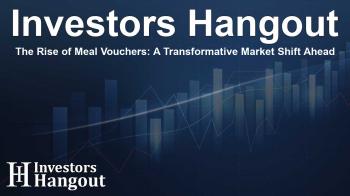The Rise of Meal Vouchers: A Transformative Market Shift Ahead

Growth of Meal Vouchers and Employee Benefit Solutions
The global meal vouchers and employee benefit solutions market is on the verge of a significant transformation. It's projected to grow by a remarkable USD 21.32 billion from 2025 to 2029, with a compound annual growth rate (CAGR) of 4.3%. This growth can be largely attributed to the increasing adoption of digital solutions and substantial tax benefits associated with meal vouchers as businesses strive for greater employee engagement and welfare.
Key Drivers of Market Expansion
The Role of Tax Benefits
Tax benefits play a crucial role in enhancing the appeal of meal vouchers in the corporate landscape. Companies are now increasingly aware of how offering meal vouchers can positively impact their financial frameworks and employees' satisfaction levels. The trend of digital meal vouchers has further augmented this growth, as companies adopt these innovative solutions to streamline operations while meeting the diverse needs of their workforce.
The Impact of Digital Technologies
With the expanded internet availability in developing countries and the widespread use of smartphones, digital meal vouchers are becoming more prevalent. Organizations like Sodexo and Edenred are at the forefront, transforming their operations to provide seamless and customized services using advanced digital technologies. Through applications and online platforms, businesses are enhancing convenience for employees while ensuring that users have access to various options that cater to dietary preferences and work-life balance.
Challenges in the Market Landscape
Data Privacy and Security Concerns
While the growth potential is immense, there are challenges such as data privacy and security risks tied to digital meal vouchers. As organizations increasingly rely on mobile applications to deliver employee benefits, the need to safeguard personal information of users emerges as a top priority. Ensuring robust security measures is essential to mitigate the threat posed by privacy breaches in this digital age.
Shifting Consumption Patterns
Changing consumer behaviors, influenced by geopolitical factors and economic shifts, are also presenting challenges. Companies must navigate these complexities to ensure their meal voucher offerings remain relevant and effective. The integration of meal vouchers with services like partner restaurants and food delivery apps can enhance the accessibility and appeal of these benefits for employees, particularly in the current climate where flexible work arrangements are increasingly desirable.
Market Segments and Growth Prospects
The market for meal vouchers can be broken down into several key segments — including type, product, and geography. Meal vouchers dominate the market landscape, with an ever-expanding product portfolio that now includes non-cash and cash vouchers. Suppliers are exploring opportunities beyond traditional meal offerings, incorporating travel vouchers and wellness programs that continue to elevate employee benefits.
Corporate Social Responsibility and Employee Engagement
As companies increasingly focus on corporate social responsibility (CSR), integrating meal vouchers and employee benefits into their organizational strategies helps in promoting work culture and enhancing employee morale. By prioritizing employee welfare through these programs, organizations not only attract talent but also foster loyalty amongst their workforce. Furthermore, the inclusion of holistic wellness programs supported by meal vouchers illustrates a commitment to the overall well-being of employees, which is invaluable in the competitive corporate landscape.
Frequently Asked Questions
What is the projected growth of the meal voucher market?
The meal vouchers and employee benefit solutions market is projected to grow by USD 21.32 billion from 2025 to 2029, at a CAGR of 4.3%.
How do tax benefits impact the meal voucher market?
Tax benefits increase the attractiveness of meal vouchers for businesses, motivating more organizations to adopt them as part of their employee benefits packages.
What challenges does the market face?
Challenges include data privacy and security concerns as more companies move towards digital solutions and shifting consumer behaviors influenced by economic factors.
Who are the key players in this market?
Notable players include Sodexo, Edenred, and various financial wellness platforms integrating meal vouchers.
Why are meal vouchers becoming popular in organizations?
Meal vouchers are popular as they promote employee satisfaction, enhance work culture, and provide tax advantages for both employees and employers.
About The Author
Contact Dominic Sanders privately here. Or send an email with ATTN: Dominic Sanders as the subject to contact@investorshangout.com.
About Investors Hangout
Investors Hangout is a leading online stock forum for financial discussion and learning, offering a wide range of free tools and resources. It draws in traders of all levels, who exchange market knowledge, investigate trading tactics, and keep an eye on industry developments in real time. Featuring financial articles, stock message boards, quotes, charts, company profiles, and live news updates. Through cooperative learning and a wealth of informational resources, it helps users from novices creating their first portfolios to experts honing their techniques. Join Investors Hangout today: https://investorshangout.com/
The content of this article is based on factual, publicly available information and does not represent legal, financial, or investment advice. Investors Hangout does not offer financial advice, and the author is not a licensed financial advisor. Consult a qualified advisor before making any financial or investment decisions based on this article. This article should not be considered advice to purchase, sell, or hold any securities or other investments. If any of the material provided here is inaccurate, please contact us for corrections.

